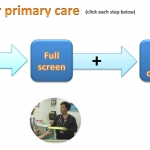A compelling method for working in the space between addiction research and practice.
Evidence-Based and Best Practices
SBIRT Fits in Today’s (and Tomorrow’s) Provider Business Model
There has been a groundswell of SBIRT activities in northeastern Ohio, a movement. An Ohio treatment center provides SBIRT at an FQHC, a region that works cooperatively, and everybody wins.
Just in Time for Brain Awareness Week
The Interagency Coordinating Committee on the Prevention of Underage Drinking presented a webinar about brain research and underage screening. Stay up to speed on SBIRT, drugs, and the teenage brain.
Utilizing SBIRT in a student-run free clinic
Med student and Scaife alumna Miranda Greiner brings motivational interviewing, SBIRT to her work in Kansas.
When Numbers Get Serious
Every year in Allegheny County, more people die of accidental drug overdose than in traffic accidents and homicides combined. Drugs cause a third of all accidental deaths in Allegheny County in PA.
Spotlight on SBIRT Oregon
Google “SBIRT projects” and you’ll find lots of federally-funded efforts to learn about service delivery models for SBIRT in various settings. Today, we will talk about how an Oregon team creates a curriculum tackling SBIRT implementation in primary care.
Alcohol and violence are so often intertwined
Addiction treatment veteran Jim Aiello discusses our reluctance to examine the alcohol-violence connection and proposes a solution.
Marijuana and Teens: a complex and risky relationship
For at least a quarter of a century—and probably much longer—American teens have been using marijuana more than any other illicit drug. Today, at the beginning of 2013, teen marijuana use is up. IRETA staff member Dr. Dawn Lindsay lends insight in the wake of legalization.
Gateway Rehabilitation opens Youth Services Center
Executives cut the ribbon at the new Youth Services Center in Center Township. The new facility offers badly needed adolescent- and gender-specific treatment in Western PA.
Saving the Party
In April, Councilman Bruce Kraus brought the Responsible Hospitality Institute (RHI) to Pittsburgh to reduce the negative impact of nightlife on the neighborhoods that host it.














